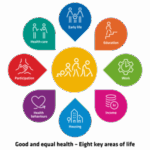In today’s fast-paced world, health is often overlooked until something goes wrong. From skipping meals due to a hectic schedule to sacrificing sleep for productivity, modern lifestyles are full of habits that damage our overall health. However, understanding the value of health is the first step toward achieving a balanced, fulfilling life.
This blog post covers all the essential aspects of health, including physical fitness, mental well-being, nutrition, lifestyle diseases, and preventive care. Let’s dive into why health is truly our greatest wealth and how we can protect it.
What is Health?
Health is not just the absence of disease. According to the World Health Organization (WHO), health is a state of complete physical, mental, and social well-being. A healthy individual is not only free from illness but also has the energy and stability to live a fulfilling life.
There are three main components of health:
- Physical Health – The state of the body and its systems.
- Mental Health – Psychological and emotional well-being.
- Social Health – How we interact and build relationships with others.
Physical Health: The Foundation of a Healthy Life
Maintaining physical health involves regular exercise, proper nutrition, adequate sleep, and routine check-ups. It helps in:
- Boosting energy and stamina
- Preventing chronic illnesses like diabetes, heart disease, and obesity
- Enhancing immune function
- Improving mobility and strength as we age
Tips for Better Physical Health:
- Get 30 minutes of exercise daily (e.g., walking, cycling, yoga)
- Eat a balanced diet rich in fruits, vegetables, whole grains, and lean proteins
- Avoid smoking, excessive alcohol, and junk food
- Sleep for 7-8 hours each night
- Stay hydrated by drinking plenty of water
Mental Health: The Silent Struggle
Mental health is just as important as physical health. Stress, anxiety, and depression are rising globally due to social media pressure, work stress, and lack of emotional support.
Signs of Poor Mental Health:
- Constant fatigue or lack of motivation
- Feeling overwhelmed, anxious, or sad
- Trouble concentrating
- Changes in sleep or appetite
Ways to Improve Mental Health:
- Practice mindfulness and meditation
- Talk to friends, family, or a mental health professional
- Take breaks and manage stress through hobbies
- Limit screen time and social media use
- Seek help when needed—it’s okay not to be okay
Nutrition: You Are What You Eat
A healthy diet is essential to support body functions, energy levels, and mental clarity. Malnutrition, whether due to overeating or undernourishment, leads to health issues.
A Balanced Diet Should Include:
- Carbohydrates – for energy (e.g., grains, fruits)
- Proteins – for growth and repair (e.g., eggs, legumes)
- Fats – for cell health (e.g., nuts, oils)
- Vitamins & Minerals – for immune support and function (e.g., leafy greens, dairy)
- Water – for hydration and metabolism
Avoid processed foods, sugary drinks, and high sodium items. Opt for home-cooked meals and eat at regular intervals.
Preventive Healthcare: A Smart Investment
“Prevention is better than cure” is not just a proverb—it’s a life-saving philosophy. Regular screenings and early detection of diseases like hypertension, diabetes, or cancer can significantly reduce risks.
Preventive Measures:
- Annual health check-ups
- Vaccinations for children and adults
- Dental care and oral hygiene
- Eye exams and hearing tests
- Tracking BMI, cholesterol, and blood pressure
Preventive healthcare can reduce medical costs, increase life expectancy, and improve quality of life.
Lifestyle Diseases: A Growing Concern
Diseases like heart disease, diabetes, obesity, and certain cancers are linked to poor lifestyle choices. According to the WHO, non-communicable diseases (NCDs) account for 74% of all global deaths.
Common Risk Factors:
- Poor diet
- Lack of exercise
- Tobacco and alcohol use
- Chronic stress
How to Reduce Risk:
- Maintain a healthy weight
- Engage in physical activity
- Eat mindfully and avoid processed food
- Limit screen time and stay active
- Get regular medical advice for early signs
Importance of Immunization
Vaccines are a powerful way to prevent infectious diseases like polio, hepatitis, measles, and influenza. Immunization protects not just the individual but also the community.
Key Benefits:
- Prevent deadly diseases
- Reduce healthcare burden
- Promote longer life expectancy
- Boost immunity in children and adults
Encourage timely vaccinations for children and adults. Participate in public awareness weeks like World Immunization Week (April 24–30).
Health and Children
Healthy children grow into healthy adults. Pediatric health includes regular immunizations, proper nutrition, physical activity, and mental stimulation.
Essentials for Child Health:
- Breastfeeding and nutritious weaning
- Regular health check-ups
- Hygiene and hand-washing
- Physical games and outdoor play
- Emotional support and time with family
Parents and schools must work together to build a solid health foundation for children.
Health in Aging: Caring for the Elderly
As people age, their bodies become more vulnerable to diseases and slower to recover. Elderly care should focus on:
- Fall prevention and mobility support
- Healthy diet and medications
- Mental stimulation and companionship
- Regular medical check-ups
- Screening for common conditions like arthritis, osteoporosis, and dementia
Respect, care, and emotional support are crucial to elder well-being.
Public Health and Awareness
Public health campaigns play a major role in health education and disease prevention. Governments, NGOs, and communities must invest in:
- Clean water and sanitation
- Free vaccination drives
- Nutritional awareness programs
- Mental health support systems
- Free health check-up camps
Good health is a human right—not a luxury.
Final Thoughts
Health is the true wealth that enables us to live, dream, and achieve. While technology and lifestyle trends have changed, the basic principles of good health remain the same: eat well, move more, rest enough, and stay emotionally balanced.
Take your health seriously—make time for your body and mind. Remember, your future depends on what you do today for your well-being.













